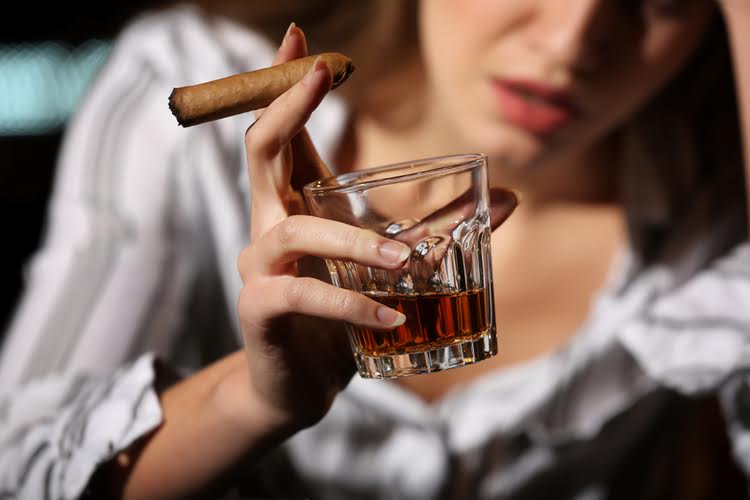A greater decrease in heart rate in ethanol treated rats compared with control rats during β-adrenoreceptor blockade with propranolol indicates that the ethanol treated rats had an increased sympathetic activity. An increase in sympathetic activity is consistent with impairment of the baroreceptors that, when activated, inhibit the sympathetic nervous system45,47. Blood pressure might be difficult to control in patients with underlying treatment-resistant hypertension, and multiple medications could be needed in some cases. Drugs commonly used in the general wards are benzodiazepines and, in intensive care units (ICU), dexmedetomidine. Both drugs effectively reduce systolic and diastolic blood pressure 104, acting at the level of central nervous system and reducing the sympathetic discharge. In addition, as demonstrated in vitro, benzodiazepines induce vasodilatation by endothelium-dependent and independent mechanisms 105.
Many people wonder about the connection between alcohol consumption and blood pressure, often hearing conflicting information. Understanding how alcohol affects this measure of cardiovascular health involves looking at both immediate and long-term effects. Several factors can increase the risk of developing high blood pressure, including genetics, lifestyle choices like diet and exercise, and medical conditions such as kidney disease and sleep apnea. To lower blood pressure, consider reducing sodium intake, increasing physical activity, losing weight, managing stress, and quitting smoking. These lifestyle changes can significantly improve does alcohol cause high blood pressure your blood pressure levels and overall heart health.

Who is Most at Risk from Alcohol Affecting Their Blood Pressure
Only three of these studies measured BP at various time points and found that alcohol has a hypotensive effect lasting up to five hours after alcohol consumption and a hypertensive effect 20 hours after alcohol consumption that lasts until the next day. The inclusion of non‐randomised studies in McFadden 2005, which are known to be at higher risk of bias, is likely the reason for the discrepancy in the magnitude of BP effects. This systematic review provides us with a better understanding of the time‐course of alcohol’s acute effects on blood pressure and heart rate.
Data Availability Statement
- Rossinen 1997 measured blood pressure but selectively reported only SBP instead of reporting both SBP and DBP.
- Results suggest that the decrease in BP with very high doses of alcohol is greater compared to lower high doses of alcohol.
- However, we noted the lack of description of randomisation and allocation concealment methods in most of the included studies as a reason for downgrading because of the possibility of selection bias.
Whelton is also the chair of the American Heart Association’s 2017 Hypertension Practice Guidelines and a member of the writing committee for the Association’s 2021 Scientific Statement on Management of Stage 1 Hypertension in Adults. First, there was the possibility of undesired bias and imprecision due to imputations of missing statistics. Most of the included studies did not report the standard error (SE)/standard deviation (SD) of the mean difference (MD) for the outcomes of interest.
Ariansen 2012 published data only
Maheswaran et al.36 evaluated the effectiveness of physician advice to reduce alcohol consumption in hypertensive patients. In the advice group, alcohol consumption fell by 50% and was accompanied by an approximately 20% reduction in GGT. Diastolic BP decreased significantly (by an average of 5.2 mm Hg) in the advice group compared with the control group. Certain studies have implicated the role of cortisol in alcohol-induced rise in blood pressure66-68.
- For high doses of alcohol, we found moderate‐certainty evidence showing a decrease in SBP and low‐certainty evidence suggesting a decrease in DBP within the first six hours and 7 to 12 hours after consumption.
- An increase in sympathetic activity is consistent with impairment of the baroreceptors that, when activated, inhibit the sympathetic nervous system45,47.
- This review included only short‐term randomised controlled trials (RCTs) investigating the effects of alcohol on blood pressure and heart rate.
- We also checked the lists of references in the included studies and articles that cited the included studies in Google Scholar to identify relevant articles.
Medical
Dehydration and electrolyte imbalances can cause blood vessels to narrow and the heart to work harder, further contributing to spikes in blood pressure. After drinking alcohol—especially in moderate to large amounts—your blood pressure can increase for several hours. This temporary spike Substance abuse occurs because alcohol stimulates the nervous system and affects the balance of hormones that help regulate blood vessel tone and kidney function. Drinking alcohol increases blood pressure and repeated drinking causes sustained high blood pressure.

In the Special Health Report Controlling Your Blood Pressure, find out how to keep blood pressure https://ecosoberhouse.com/ in a healthy range simply by making lifestyle changes such as losing weight, increasing activity, and eating more healthfully. Swapping some of your usual alcoholic drinks for a tasty non-alcoholic option is an easy way to cut back. Or making a permanent switch to lower alcohol alternatives can be a sustainable approach to cutting down in the longer term, if you’re not ready to give up alcohol.
Mahmud 2002 published data only
Abrupt interruption of alcohol intake in heavy drinkers may cause the onset of symptoms that characterize the AWS 95. Tremors, sweating, agitation, nausea, vomiting, tachycardia, and hypertension begin in alcohol abusers 6 to 24 h after the last alcohol intake 95. Only a few patients, however, evolve to the psychotic manifestations and cardiovascular collapse that are the features of the delirium tremens (DT). Drinking more than three drinks in one day or heavy alcohol use over time significantly raises blood pressure alcohol levels. When you drink alcohol, several processes occur in your body that influence blood flow and blood pressure levels.
- We recorded the washout period of each included study reported by study authors to decide if there was risk of a carry‐over effect.
- And if you drink heavily and quickly, Goldberg says it can set you up for heart arrhythmias, which are abnormal or irregular heartbeats.
- If future RCTs include both men and women, it is important that their blood pressure and heart rate readings are reported separately.
- Moderate alcohol consumption, defined as one drink a day for women and up to two drinks a day for men, may have minimal effects on blood pressure alcohol.
Covault 2014 published data only

If you already have high blood pressure, cutting down on alcohol or stopping altogether can help to reduce or control it. However, drinking more than the recommended amount can be harmful to your heart and general health. There are few strategies for the control, prevention and treatment of alcohol-induced hypertension as shown in Figure 2.
Systolic and diastolic blood pressure (SBP, DBP) were measured by trained technicians (mmHg). Smoking, physical inactivity, and diet were self-reported and categorized according to American Heart Association criteria, and medication adherence was assessed using self-reported typical adherence to antihypertensive medications. All in all, the theories of the cardiovascular benefits surrounding the French alcohol-blood pressure Paradox are mostly false. Instead, we should remember that alcohol is always best consumed in moderation (up to two drinks a day for men, one for women). Most importantly, adhering to a healthy lifestyle will help us to achieve the other cardiovascular health metrics that help lower one’s chance of getting cardiovascular diseases. For those with a family history of high blood pressure, it is even more crucial to manage your alcohol consumption to prevent the affliction of hypertension.

